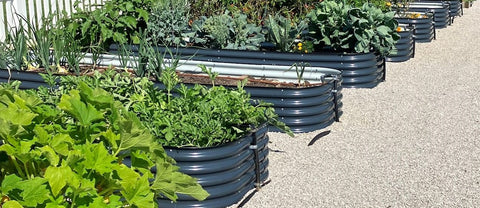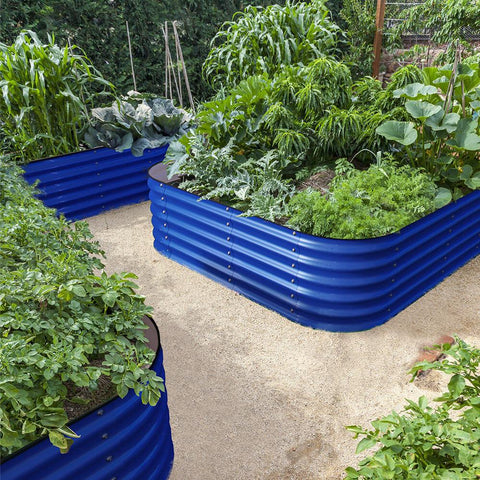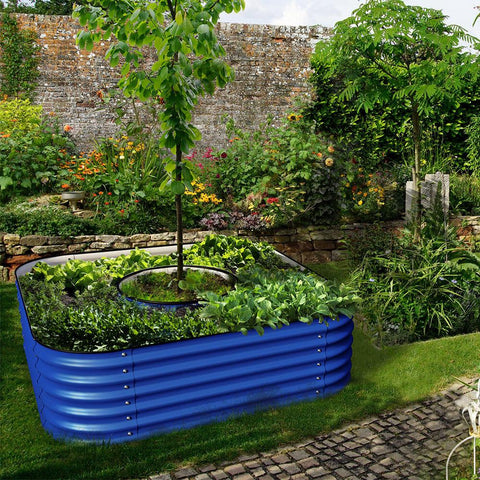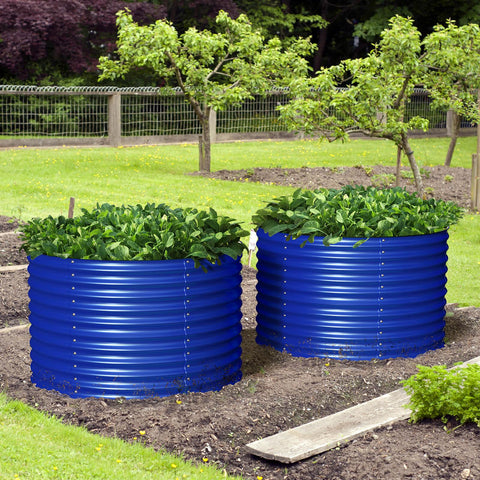The Best Companion Plant of Lemon Tree on Garden beds
The best companion plant of lemon tree will attract pollinators and predatory insects. Bees and butterflies help to pollinate trees, thereby achieving greater harvests. Beetles, flies and wasps attack common citrus pests. The best companion plants to attract these insects are herbs and flowers.This content also has some reference value for Olle Garden Beds
Citrus trees are vulnerable to a variety of pests, which makes many homeowners at a loss to find solutions to protect their juicy harvests. As more and more gardeners seek pesticide free solutions, homeowners hesitate to spray chemicals on their trees.
Insecticides also have the negative side effects of eliminating beneficial insects, including bees, bumblebees, butterflies, wasps, beetles and flies. These pollinators play an important role in lemon production, which means that chemical control usually leads to ornamental plants without insects and fruits.
However, not all herbs and flowers are beneficial, and not all herbs and flowers thrive in the same climate zone like lemon trees.
Before you turn your lawn into a forest of herbs and flowers (although no one will stop you - that would be amazing), it is important to know exactly what your companion plants should do.

What is companion plant?
A companion plant is any plant used to benefit another plant.
Companion plants have five basic functions:
- Improved pollination
- Eliminating pests
- Improved soil
- Save water
- Control weeds
For lemon trees, the most important companion plants are those that attract pollinators and repel pests. Soil improvement, water conservation and weed control are more important in vegetable gardens and landscape beds.
Companion plant for increasing pollination of lemon trees
Lemon trees are dioecious, which means they have both male and female reproductive organs on the same tree. Some trees have separate male and female flowers, while others have perfect flowers - or flowers that contain both male and female parts.
Dioecious plants are more likely to pollinate than monoecious plants (completely male or female). The wind moves the branches and disrupts the flowers, causing pollen to fall on the stigma and fertilize the eggs, producing fruit.
Although wind pollination can produce a considerable number of fruits, insect pollination greatly increases the harvest. Bees and butterflies will actively move pollen from one flower to another when they feed on nectar, which leads to higher success rate of pollination.
The easiest way to attract pollinators to lemon trees is to plant a large number of flowers nearby.
Bright and colorful flowers such as zinnia, daisy, marigold and sunflower are neon lights beneficial to insects. The attractive fragrance of lemon flowers will encourage the enthusiasm of pollinators.
Lemon trees bloom in spring and/or autumn, so use companion plants that bloom at the same time.
Companion plants that attract pollinators
Lemon trees grow in the 9-11 area of the United States. Therefore, you should choose companion plants that thrive in these same areas. Companion plants are beneficial only when they are healthy; Plants growing outside the climate zone are stressed and may attract pests.

The following is a list of plants that attract bees and butterflies in Zone 9-11:
Bottle brush
California clove
Ice factory
Lantana camara
Echinacea
Mexican shrub sage
Marigold
Calliopsis
Borage
Hyssop
Yarrow
Oregano
Sunflower
Zinnia
Bee cream
What should not be planted near the lemon tree
Most flowers and herbs either attract pollinators or are at least neutral. However, some plants may actually drive away bees and butterflies. You should be careful not to plant them too close to the lemon tree.
Wormwood
Eucalyptus
Citronella
Companion plant for preventing lemon tree pests
There are three types of companion plants used against pests:
- Aromatic plants that inhibit pests
- Trapping crops to lure pests away from better plants
- Plants that attract predatory insects to feed on pests
Lemon trees fight against many pests, including aphids, scales, mealybugs and whiteflies. Although companion plants are not 100% effective in preventing pests, they are an important part of creating a self regulating ecosystem.
It is important to note that attracting predators requires two things:
- Specific plants
- Pests
When you rely on companion plants to control pests, you must tolerate small pest populations to provide food for predatory insects. A successful companion garden will control pests - not eliminate them.
A plant that repels pests
Aromatic plants naturally repel pests and attract pollinators. Many herbs and flowers that attract bees and butterflies can also drive away harmful insects.
Feverfew
Allium
Coriander
Fennel
Plants that trap pests
Trapping crops is another common method of pest management using companion plants. In this case, the goal is to grow crops that are more popular with ordinary insects than the plants you want to preserve.
Trapping crops is most commonly used to attract aphids. These pests will produce sticky substances on plants and attract more pests. Therefore, controlling aphids will help prevent various insects from eating lemon trees.
Globeflower
Sunflower
Nettle
Plants that attract predatory insects
Although many insects prey on pests, gardeners already like (or at least can tolerate) some powerful insects:
- Spiders
- Ladybugs
- Sandfly
- Hovering flies
- Mantis
- Parasitic wasps

These insects feed on pests. Although some plants can attract them, pests keep them around. The goal is to maintain a healthy population of predatory insects to prevent pests from taking over.
The most common pests of lemon trees are:
- Scale
- Spider mites
- Aphids
- Pink scale
- Ye Miner
- Whitefly
Many predatory insects are more beneficial in the larval stage than in the adult stage. Ladybird larvae can eat 10 times of adults. Parasitic wasps lay eggs in pests and use them as food sources. You may not have noticed these beneficial bugs, but if you see a stable adult population, please rest assured that more teenagers are working hard.
Chinses angelica
Dill
Statis
Sweet Alisum
In addition to the plants listed above, the following flowers and herbs will attract pollinators and predatory insects:
- Calendula
- Allium
- Caraway
- The universe
- Fennel
- Small white chrysanthemum
- Yarrow
If your partner's garden space is limited, these are the most beneficial plants you can plant so far.

How to plant companion plants
Even a flower or herb can help attract some bees or ladybugs, but the real power of companion planting is to create a diverse ecosystem with many different beneficial plants.
Plant as many different plants as possible. Mix herbs and flowers together to form several different companion gardens near the lemon tree drip line. This will attract pollinators to the outside of the tree - where the flowers are - and create a barrier between pests and the inside of the tree.
Place some shallow water dishes. If pollinators and predators are a complete ecosystem, they are more likely to settle in your partner's garden. Clean and accessible water not only makes the garden a home for insects, but also encourages small beneficial animals such as toads and birds.
Use your garden as a companion garden. If your space is limited, please use your garden as the base camp for companion plants. Plant herbs and flowers in salad vegetables, tomatoes, melons, etc. To benefit your lemon trees and vegetables.
Treat your partner's garden as if it were a real garden. Beneficial plants work only when they are healthy. The maintenance cost of most companion plants is very low, but if you ignore them completely, drought stress, weeds and lack of nutrition will damage your garden. When plants are under pressure, they will stop attracting beneficial insects and start attracting pests, which may quickly take over your lemon tree. Water regularly, weed and fertilize when necessary.
